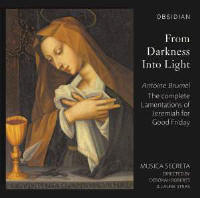Texte paru dans: / Appeared in: |
|
|
Reviewer: J.
F. Weber
Some Renaissance composers set
the texts of the nine lessons for the first nocturn of Matins for the last
three days of Holy Week as a set. Drawn from the Lamentations of Jeremiah
the Prophet (the book following Jeremiah in the Hebrew Bible), the lessons
draw on just half of the full text of the book. Antoine Brumel (c. 1460–c.
1515) was not known to be one of them. One manuscript in Florence had two
lessons (part of the first lamentation for Good Friday) and a concluding
Jerusalem, convertere attributed to Brumel, but only recently, in another
manuscript preserving a great number of anonymous settings of lamentations,
the same verses were found, and the same refrain was repeated in a series of
lamentations linked by related motifs. Hence the anonymous lessons could be
linked to those attributed to Brumel, and a complete set emerged. That is
what we hear now, if only for Good Friday.
The five tracks correspond to
the modern liturgical books: tracks 1 and 2 are the first lamentation;
tracks 3 and 4a are the second; tracks 4b and 5 are the third, with two
extra verses at the end of track 5. The notes explain the division of the
text into five lamentations by Brumel’s intent to use the settings not in
the Tenebrae liturgy but as a tragedy in the style of Seneca, five acts in a
Passion drama, probably performed by a confraternity. The disc is filled out with motets from another manuscript written by the same scribe for a convent of nuns in Florence but now preserved in Brussels. Among the eight motets recorded here are three of only four that have composers attributed to them. The most familiar of these is Josquin’s Recordare virgo Mater, last recorded by Andrew Kirkman (25:4), while Loyset Compère’s Paranymphus salutat virginem seems to be a first recording. All of the music on the program is sung by a women’s ensemble, for whom some of the music was transposed. The singing is charming and the final selection, a seven-minute anonymous Salve Regina in an alternatim setting, is ravishing. This well-filled program is of unusual interest.
| |
|
|
|
|
|
|
|
Cliquez l'un ou l'autre
bouton pour découvrir bien d'autres critiques de CD |
|




